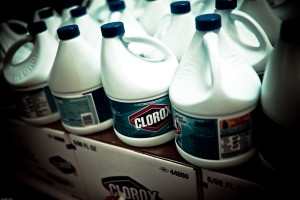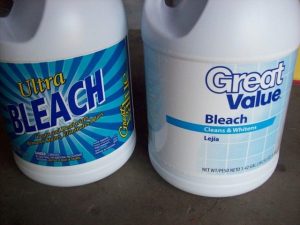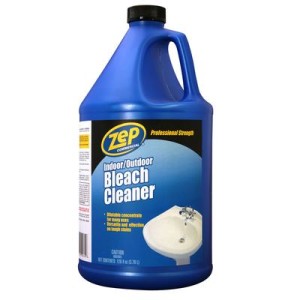This article contains affiliate links. If you make a purchase after clicking on a link I may earn a small commission at no extra cost to you.
Can you be Allergic to Bleach?
Symptoms of Bleach Allergy
The most common symptom for a bleach allergy is swelling. The exposed area will become inflamed and red. This can be immediate but in most cases several hours will pass before the symptoms occur. It must be remembered always with allergies and intolerance that sensitivities differ enormously from individual to individual.
Bleach sensitivity also can vary greatly, some individuals can display severe symptoms they are allergic to bleach fumes.
Another very common symptom is uncontrollable itching. The area where exposure occurred will begin to itch. Attempting to scratch the area causes extreme pain to the victim.
 Some key factors with a bleach allergy include length of exposure, repeated exposure and age.
Some key factors with a bleach allergy include length of exposure, repeated exposure and age.
For instance, a splash of bleach on the skin of a person allergic to bleach that is immediately removed may cause only a slight reaction. My son suffered a reaction to the chlorine in a spa bath, and ended in blotches then small scabs while his skin was healing.
He does not show any symptoms when swimming in a pool that uses chlorine. The issue of the spa bath would have been due to the higher temperature of the in addition to the greater concentration of chlorine in the water. Spa baths are well known to be an environment that can encourage the proliferation of bacteria. One the other hand, prolonged exposure can produce life threatening symptoms.
Causes of Bleach Allergy
The exact cause of a bleach allergy is not known. However, most doctors believe that prolonged and repeated exposure can make a person allergic.
This is especially common in those that work in the laundry industry. Homemakers are also likely to become allergic to bleach.
In recent years some discoveries have been made as to genetics and their involvement in certain allergies, bleach being one of them. It is very likely that a child born to a parent that is already allergic to bleach will become allergic as they age.
Cures and Treatments for Bleach Allergy
There is no known cure for a bleach allergy. Treatment will vary depending on the patient and the severity of the reaction.
The most common treatment is steroids to stop the inflammation. This treatment is the best course of action for those that can handle taking large doses of steroids for a week.
However, those unable to take steroids have options as well. A good cooling lotion, such as those used for poison ivy are very effective in reducing the itching and swelling from the reaction.
Applying ice packs to the swollen area is an easy way to ease the pain a bleach allergy can cause. However, one should not leave the ice on for too long. Moisture can actually irritate the area and cause more pain for the patient.
 The best idea is to avoid the use of bleach and products that contain bleach. If bleach must be used then protective gloves, clothes and eyewear should be worn at all times.
The best idea is to avoid the use of bleach and products that contain bleach. If bleach must be used then protective gloves, clothes and eyewear should be worn at all times.
Be sure to dry surfaces in the home that have been exposed to bleach thoroughly to avoid accidental exposure.
Bleach Allergies – Many people are susceptible to bleach or chlorine. Chlorine is used in a variety of products as a cleaner, disinfectant as well as being a bleaching agent. Chlorine is used in a broad range of products from hair coloring to cleaning products. Bleach is also used as a disinfectant in swimming pools and spa baths.
But now recent research has found that children whose parents use bleach regularly are more likely to come down with tonsillitis, flu and other infections particularly related to the respiratory tract.
The researchers suggest that using of bleach regularly as a cleaning product may generate volatile airborne compounds that can potentially damage lungs causing inflammation and subsequent infections are more likely to occur.Each year the medical community is discovering another allergy affecting the population. Although it may seem strange that allergies are now being discovered.
But rather than new allergies are being discovered it is very likely that previous conditions were misdiagnosed. This aspect combined with increasing exposure to various chemicals has lead lead to an increase in the prevalence and seriousness of reaction to various chemicals as well as to various foods. Bleach Implicated in Child Illness
Bleach is probably one of the most common household chemicals in the world. It is used each and everyday to clean clothes, hard surfaces bathrooms and a variety of other items. However, bleach is also one of the most common allergens that can be found in homes all over the world.
Where do you find bleaches?
- Many household cleaning products. Particularly the more aggressive bathroom & toilet cleaners
- Hair products – particularly to lighten the color of the hair
- Laundry detergents – particularly whitening products Nappy clean etc.
- Commercial laundry
- Swimming pools’ that utilize chlorine
- Spa baths that use chlorine
- Medical products – some antiseptic products
The is no cure for Bleach allergy. Like many allergic reactions the best advice is to avoid contact if possible. We recommend the use of alternatives to harsh chemicals where possible. We have listed some of the most popular cleaning products here that have been recommended by many buyers.
Read the reviews so you have a better understanding of how successful people have found these cleaning products whilst reducing their overall exposure to potentially harmful chemicals.
Others who found this article valuable also found us by face bleach allergy, hair bleach allergy, chlorine bleach allergy and clorox bleach allergy, bleach allergy rash, and bleach allergic reaction.
